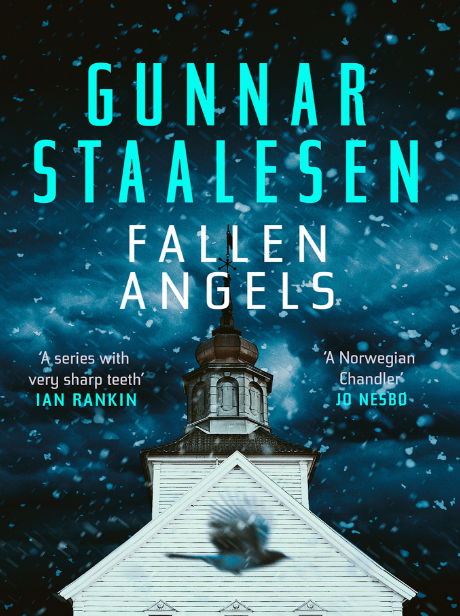Fallen Angels By Gunnar Staalesen
 On today’s book tour, I’ve an extract from Gunnar Staalesen’s new book called ‘Fallen Angels’.
On today’s book tour, I’ve an extract from Gunnar Staalesen’s new book called ‘Fallen Angels’.
Sit back and enjoy the first chapter from this Nordic Noir.
We stood outside the chapel. None of us looked at one another directly; no one wanted to take the initiative and leave. By the front door Jan Petter’s widow, eyes red-rimmed, was receiving the last mourner’s condolences with a limp handshake. The sleet landed on our shoulders like colourless confetti.
Even Paul Finckel’s strident sarcasm had dwindled to nothing.
‘Anyone want a lift into town?’
‘I’ve got my car here,’ I said.
‘What about going out for a beer, all three of us? I just have to nip down to the newspaper.’ Finckel looked at Jakob.
‘That’s an idea. I have to go home first and take care of the kids.’
‘Where do you live?’
‘In Nygårdshøyden.’
I looked at Finckel. ‘I’ll drive Jakob down. Where shall we meet?’
‘We might have to drive our youngest daughter to my sister’s,’ Jakob said. ‘She lives in Sandviken.’
‘Call me when you’re ready,’ Finckel said. ‘I’m at the paper. It’s pretty central as far as all the important watering holes are concerned.’
‘That’s why he works there,’ I added.
‘There are worse reasons,’ Finckel grunted, and left.
We followed him down to the car park.
We drove in silence from Møllendal, crossed Gamle Nygård bridge and took the illegal left-turn the new traffic arrangement almost invited you to take, to Marineholmen, on the southern side of Nygård Park.
Jakob explained where he lived. Halfway between St John’s church and Sydnæs Battalion marching band. The decibel level rose considerably in the spring as Easter week approached, with the pealing of bells at all times of the day and the band doing their drills every Tuesday and Saturday.
‘How many children have you got?’ I asked as we passed the football ground in Møhlenpris. ‘Three,’ he answered. ‘Though they’re not all children really … Maria’s sixteen. Then there’s Petter, who’s fourteen, and little Grete, who’s six. She’s the one who’s the problem if Maria can’t look after her for a few hours.’
As we turned up to the top of Olaf Ryes vei, he said: ‘My wife’s … moved out.’
I nodded, but said nothing.
The building where he lived was in the middle of the district. It had a redbrick façade and faced the shadowy side of the street. Jakob lived on the first floor in two flats that had been merged into one.
Midway up the dark stairwell he stopped with one hand on the railing, half turned to me and said pensively: ‘How do you get on with Jesus, Varg?’
The unexpected question made me feel like a turtle that had been whipped onto its back and deprived of any protection. I mumbled: ‘Well, I …Why do you ask? Are you related?’
He scrutinised me. Then he shot me a gentle smile. ‘It’s strange, meeting you again after such a long time. A lot of water’s flowed under the bridge, eh?’
I nodded in agreement. A lot of water indeed.
Then he carried on up. He rang the doorbell as he put the key in the lock and held the door open for me.
We went into a long, dark hallway. On the floor was an open, light-brown leather satchel. Shoes and boots were strewn across the floor and on a chair there were piled four or five jackets of various sizes and styles. On a little chest of drawers I espied an old-fashioned black telephone under a stack of brochures, free newspapers and unopened junk mail. Somewhere nearby I felt the monotonous throb of disco rhythms.
The door to a blue kitchen was open. Plates, cups, glasses and breakfast items were still on the table and a somewhat sickly smell of rancid fat and stale carrots wafted out to us.
Jakob closed the kitchen door and opened another, to the sitting room. ‘Come in, Varg.’ Then he shouted: ‘Maria! Are you at home?’
After an unhurried pause a door opened further down the corridor and the pop music became louder. ‘What’s up?’ a young girl said.
Jakob’s voice was drowned out as he advanced down the corridor.
I looked around the large sitting room, which was L-shaped as two rooms had been merged and the dividing wall replaced with a big, white sliding door.
At the back, on wooden flooring treated with lye, there was a black grand piano surrounded by rag rugs and black-and-white pictures on the walls. One wall was covered with shelves of books and sheet music, and inside a half open cupboard I glimpsed a not inconsiderable collection of records and cassettes.
If that wasn’t enough to quench your thirst, you can pre-order ‘Fallen Angels’ from Amazon and is available to buy from good bookshops from 12th November 2020.
Leave a Reply